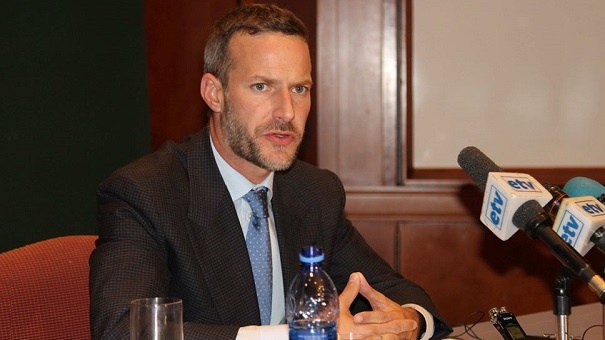
ADDIS ABABA (Semonegna) – Adam Boehler, Chief Executive Officer of the U.S. International Development Finance Corporation (DFC), visited Ethiopia 13–14 November 2019 to promote U.S. investment in Ethiopia and strengthen relationships with key partners in support of mutual development goals.
The visit marks Boehler’s first official travel to Ethiopia as CEO of the DFC, a new U.S. Government agency that combines and modernizes the Overseas Private Investment Corporation (OPIC) and USAID’s Development Credit Authority (DCA). Equipped with a more than doubled investment cap of $60 billion and new financial tools, DFC has more resources to mobilize private sector capital to address development challenges and advance U.S. foreign policy in priority regions such as Sub-Saharan Africa.
Boehler met with President Sahle-Work Zewde, Prime Minister Abiy Ahmed, National Bank of Ethiopia Governor Dr. Yinager Desse, Minister of Finance Ahmed Shide, Minister of Water, Irrigation and Energy Dr. Sileshi Bekele and leaders from the private sector, to discuss DFC’s approach to mobilize private capital to invest in projects that create jobs and opportunity in emerging markets.
“We are prepared to make multi-billion-dollar investments in Ethiopia and its people,” CEO Adam Boehler said. “This collaboration is an opportunity for Ethiopia and the United States to strengthen our relationship around the shared goal of economic growth and prosperity.”
In related news, on 12 November 2019, DFC and the African Development Bank (AfDB) have reached a partnership agreement to support development in Africa.
DFC’s Adam Boehler and Akinwumi Adesina, President of AfDB Group signed a memorandum of understanding (MOU) strengthening collaboration in support of development in Africa. The MOU was signed at the Africa Investment Forum in Johannesburg, South Africa.
“To tackle the multitude of urgent development challenges facing Africa—from infrastructure development to financial inclusion and food security—collaboration with like-minded partners is essential,” said Boehler. “The MOU signed today will help harness the diverse strengths of DFC and the African Development Bank to make tangible progress on our shared goals across the continent.”
“The partners will focus on priority sectors including critical infrastructure, power and energy, financial services, and agriculture, and prioritize investments that empower the region’s women. Through these efforts, DFC and the Bank aim to invest a combined $2 billion, with a goal of mobilizing an additional $3 billion from the private sector alongside their investments. Doing so would support total investment of $5 billion in regional development projects. The partners will use debt financing, equity investments, political risk insurance, and other financial tools to meet these goals,” said Adesina.
The MOU is intended to leverage the collective resources of DFC and AfDB to more effectively mobilize private capital to mutual development goals in Africa. Through their collaboration, DFC and the African Development Bank will strengthen cooperation on business development, due diligence, and ongoing monitoring of jointly supported projects.
Boehler attended the Africa Investment Forum, which was held 11–13 November 2019 in Johannesburg, during a trip to Sub-Saharan Africa to highlight U.S. commitment to the region, explore private sector investment opportunities, and strengthen relationships with key regional partners.
The visit marks Boehler’s first official travel to Africa as CEO of DFC, a new U.S. Government agency that modernizes the Overseas Private Investment Corporation (OPIC). Equipped with a more than doubled investment cap of $60 billion and new financial tools, DFC has more resources to invest in priority regions such as Sub-Saharan Africa and expanded flexibility to collaborate with key partners like AfDB.
About the U.S. International Development Finance Corporation (DFC)
The U.S. International Development Finance Corporation (DFC) is America’s development bank, commissioned to reform and modernize OPIC. DFC partners with the private sector to finance solutions to the most critical challenges facing the developing world today. Working together with businesses, we invest in projects that create jobs and opportunity in emerging markets, including building critical infrastructure, expanding access to telecommunications, and providing small business financing, notably for women entrepreneurs. DFC helps to advance America’s foreign policy by partnering on projects that create economic stability, protect sovereignty, and ensure transparency. DFC investments adhere to high principles and respect the environment, human rights, and worker rights.
Sources: U.S. Embassy in Ethiopia and OPIC
